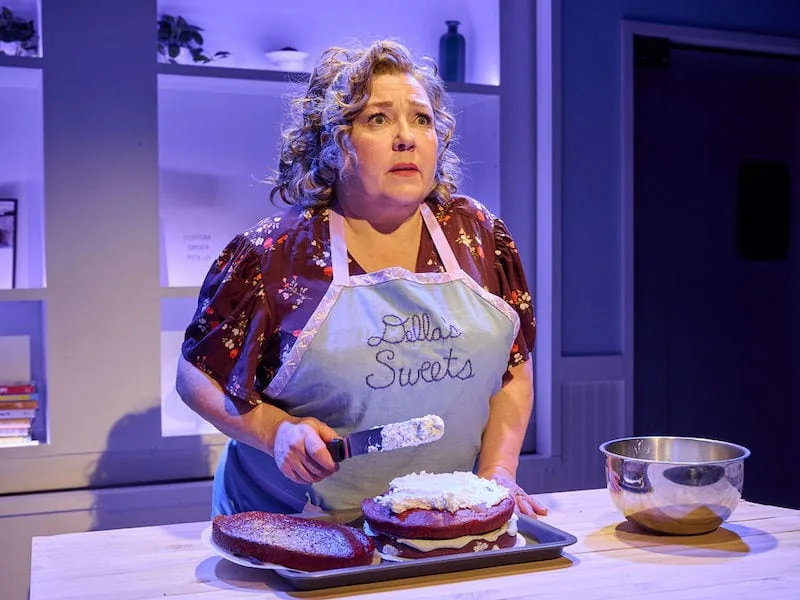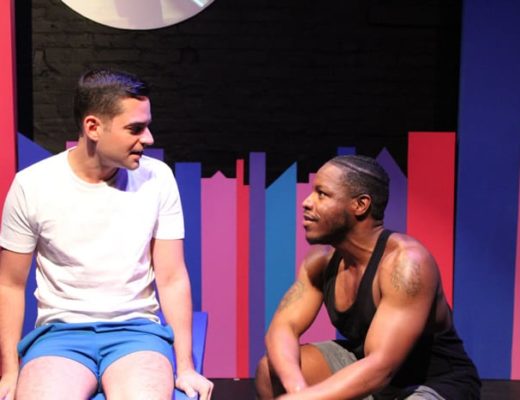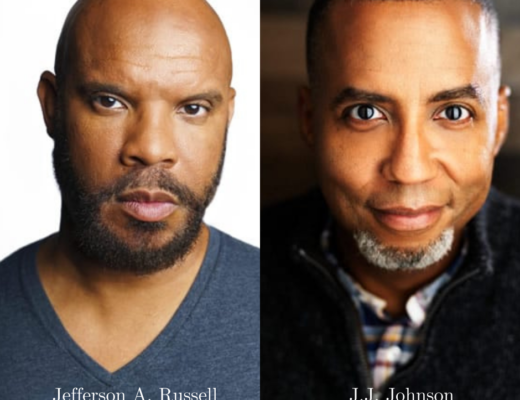By Jakob Cansler
This article was first published in DC Theater Arts: here.
Prologue Theatre is on a mission.
“We want the plays that Prologue produces to be a catalyst for deeper dialogue and conversation on topical issues,” said Artistic Director Jason Tamborini shortly after the company was founded. Prologue’s latest production, in association with NextStop Theatre Company, certainly attempts to fit that bill.
Now in performances at Atlas Performing Arts Center before moving to NextStop next month, The Cake by Bekah Brunstetter is also on a mission. In this case, though, that mission is too heavy-handed to be successful.
The Cake centers on Della (Nicole Halmos), a conservative Christian baker in North Carolina who is set to be a contestant on the fictional competition series Big American Bake-Off. She faces an internal conflict, perhaps the first real one of her life, when Jen (Tara Forseth), a woman she practically helped raise, asks her to bake a cake. Specifically, a cake for Jen’s wedding. Specifically, Jen’s wedding to another woman.
Based on that description, it may seem like The Cake’s goal is one in support of same-sex marriage and LGBTQ rights more broadly. Indeed, throughout the play, Della explicitly debates the topic with the other characters. She seeks some level of understanding about being queer from Jen. She debates furtively about politics with Jen’s bride, Macy (Sabrina Lynne Sawyer). She discusses the biblical arguments with her husband, Tim (Sam Lunay), a plumber who is much more set in his beliefs and expects Della to fall in line with him.
What this makes for is essentially a 90-minute rundown of the major points for and against same-sex marriage. Perhaps if it was performed for a different audience, The Cake would indeed seem primarily a pro-LGBTQ play. In front of a liberal-leaning, DC-based audience, though, Brunstetter’s mission is less about convincing people like Della to support same-sex marriage and more about convincing people who are decidedly not like Della that Della is not a hostile adversary.
In fact, Della is painted from the beginning as a well-intentioned hero whom the audience can root for to do the right thing. Halmos portrays Della’s complexities with ease, creating a funny and engaging character whose humanity the audience can understand.
Halmos’ Della is, however, one of the few things that are effective about Brunstetter’s mission in this play. The most obvious issue is The Cake’s over-reliance on surface-level ideas and clichés to make its points.
The other characters, for instance, do not have nearly the complexity that Della does. Jen, Macy, and Tim all exist to fulfill specific narrative purposes and, as a result, seem like two-dimensional stereotypes — Jen, the small-town girl discovering herself; Macy, the big-city liberal; Tim, the stubborn blue-collar conservative. Forseth, Sawyer, and Lunay do the best they can with a poor hand, but the way these characters are written makes for dialogue that feels like talking points.
Therein lies the overarching struggle of The Cake: there is simply a lot more telling than showing, and as a result, the multifaceted themes at play — like how our views are molded by religion, class, geography, etc. — end up oversimplified.
That The Cake’s points might be ineffective would not be much of an issue if the play still worked as a piece of entertainment, but unfortunately, because Brunstetter’s goals are so overstated, the purpose ends up dragging down the rest of the script with it. The pacing, dialogue, and structure all suffer from a lack of subtlety that makes it difficult to become engrossed in the world of the play.
To be sure, none of what makes The Cake ineffective comes on the part of Prologue or the artistic team. Aria Velz’s direction takes what could be a heavy production and makes it feel springy, and Tamborini’s scenic design — which features bedroom tableaus that appear from behind walls — makes for both an intriguing visual and an impressive use of a small space.
There is also, notably, one aspect of The Cake that does manage to conceal many of the script’s issues: humor. Despite the gravitas of the themes, The Cake never takes itself too seriously, which helps to break up the pacing. Brunstetter has a particular skill for deploying punchlines at just the right time so moments that could become cumbersome are lightened. The entire cast, especially Halmos, nails that timing consistently. Still, at the end of the day, The Cake is a play on a mission, and one that is not successful.
That being said, Prologue Theatre is also on a mission — to start conversations — and I’ll admit that after seeing The Cake, I did have a riveting conversation with a friend about these issues. In that sense and in this case, Prologue’s mission could be called a success.





No Comments